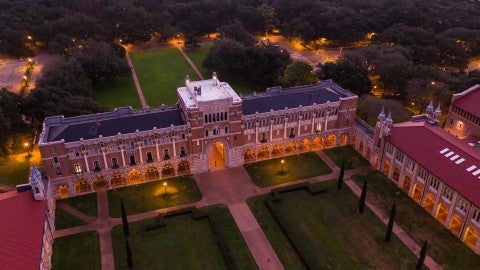Requirements for the GEM Certificate
Coursework
12 credits of coursework and 2-semester enrollment in RELI 600 GEM Research Forum (1 credit course)
Three (3) Theory-Intensive Courses
Students are required to complete one course in Gnosticism (RELI 581), one course in Esotericism (RELI 587), and one course in Mysticism (RELI 558).
One (1) Thematic Course (from list of approved courses; see April DeConick or Jeff Kripal)
Two (2) semesters of RELI 600 GEM Research Forum.
Students are required to enroll in consecutive Fall and Spring semesters during the same academic year. Although only one year of enrollment is required, students are encouraged to participate in the Forum throughout their time at Rice.
Submission of Request for GEM Certificate a semester in advance of bestowal. Certificates will be awarded each spring at our departmental graduation ceremony. The deadline for submission for spring 2025 is Monday, February 3, 2025. You may fill out the Request for GEM Certificate if your last required course is pending (being taken in spring 2025) - ALL other requirements must be completed.
NOTE: The AdobeSign form for the Request for GEM Certificate has a 30-page limit for attachments. Format your papers accordingly (single space, etc.). If you cannot shrink your attachments to 30 pages, contact Lydia Westbrook (lydiaw@rice.edu) immediately.
Submission of Graduate Declaration of University Certificate form with the Registrar’s Office before graduation (for certificate to appear on transcript). The declaration can be found in ESTHER. Follow this video to find it.
- Theory-Intensive Core Courses (3)
-
These courses are essential to the certificate because they theorize the constructed categories under study: Gnosticism, Esotericism and Mysticism. They do so from the ancient world to the modern period, giving students the necessary historical sweep to fully engage the categories and the debates surrounding them.
RELI 581: Gnosticism Seminar (DeConick)
What is Gnosticism? This course covers the construction of the category Gnosticism by scholars since the 1600s and its long-standing association with the concept of heresy and the literature and religions that people who call themselves Gnostics form. Literary, social, historical and cognitive methods are used to examine Gnostic religious currents and their survival into modernity.RELI 587: Western Esotericism Method and Theory (Fanger)
This course explores the relation between esoteric texts and the idea of "Western Esotericism." Examines primary writings from Agrippa to Madame Blavatsky and considers the historical and methodological approaches emerging as Esotericism is constructed as an academic area.RELI 558: Mysticism: Theories & Methods (Kripal and Parsons)
This course is a history of the development of the modern category of "mysticism" from the seventeenth century to today, with side studies of cognate terms like "spirituality," "metaphysical religion," and the "paranormal," as these forms of extreme religious experience are by social-scientific and humanistic methods. - Thematic Courses (1)
-
Students are asked to select one additional thematic course which focuses on the study of one particular area in detail. This focus should reflect the student's interest. This list is kept updated annually by the Department.
List of Thematic Courses
RELI 522: Islam's Mystical and Esoteric Tradition (Cook)
RELI 526: People of the Book: Judaism and Scripture (Ogren)
RELI 532: Advanced Tibetan Language & Culture (Klein)
RELI 570: Buddhist Wisdom Texts (Klein)
RELI 588: The History of Religions School (Kripal)
RELI 589: Mutants and Mystics (Kripal)
RELI 607: Archives of the Impossible (Kripal)
RELI 615: Secret Religion (DeConick)
RELI 644: Visions and Visionary Practices: Medieval to Modern (Fanger)
-
RELI 600 GEM Research Forum
-
This forum meets monthly throughout the semester. Its purpose is for faculty and students to share, discuss and critique their current research (pre-publication) in GEM subjects in order to improve the quality of the papers and to mentor students in formal academic etiquette and oral communication skills. Students are asked to write academic reflections of each event, identifying key insights and issues that may impact their own research as scholars. At the end of the year, a conference is hosted on a GEM subject. An external keynote speaker is invited. Students are asked to participate as presiders, organizers, and speakers. This is meant to provide students with the opportunity to learn how to organize and host conferences, improve their oral communication skills, and to network with scholars at other institutions.

